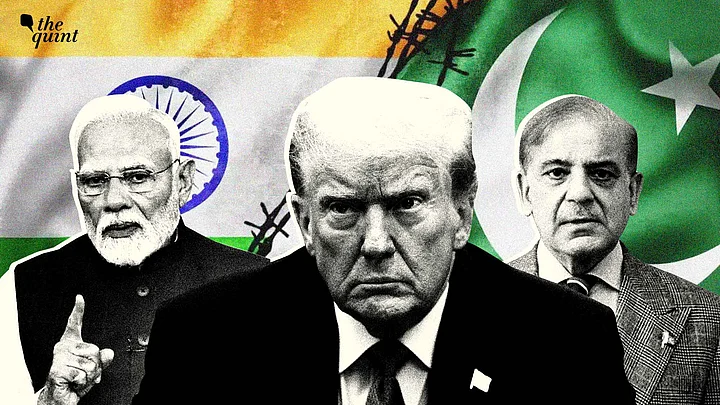One of the things that India needs in its conflict with Pakistan, which recieves perennial assistance in terms of funds and arms from China through bilateral treaties and deals, is American support. India expects the US to ask Pakistan to identify and destroy terror networks instead of pretending that they do not exist. At the same time, it is in the vested interest of the United States to assist India at this critical stage.
Pakistan defence minister, Khawaja Asif, has let the cat out of the bag by admitting that Islamabad has been supporting terrorists for decades and doing the “dirty work” for the West.
US Defence Secretary Pete Hegseth told India's Defence Minister Rajnath Singh that "the US stands in solidarity with India and supports India’s right to defend itself.”
Why Satellite Aid Matters
How can the US actually support India’s right to defend itself? An important area where the US can assist India is by extending satellite support during military operations. This is essential because Chinese satellites are helping Pakistani generals to watch India’s battle preparedness.
India has grown sensitive in recent days about the apathetic responses from partners in Western countries. This was reflected in a speech by External Affairs Minister S Jaishankar on Sunday, as he referred to reactions from Europe.
"When we look out at the world, we look for partners; we do not look for preachers, particularly preachers who do not practice at home and preach abroad. I think some of Europe is still struggling with that problem. Some of it has changed," he said, adding that Europe has "entered a certain zone of reality check".
For the past two months, Washington has been pushing India to buy F-35 fighter jets instead of sourcing Su-57 jets from Russia. It is also trying to offload Boeing jets, which was recently rejected by China. Air India is already considering buying them. It would strengthen the case for US jets if Washington backed India at this time.
Though the Donald Trump administration has drastically altered the American foreign policy, there is still no change in Washington’s desire to counter China’s growing influence with the help of Japan, Australia, and India. These countries, along with the US, are members of the Quadrilateral Security Dialogue (QUAD), meant to restrict China’s influence.
The US would be weakening India’s role in QUAD and other international forums if it refrains from supporting it at this juncture. India is also seen as a sobering influence on BRICS—Brazil, Russia, India, China, and South Africa—which often adopted a strong anti-US stance.
Put Pressure Where it’s Due: On Pakistan
The US has expressed grief about the 22 April killings in Pahalgam, Kashmir, and called for de-escalation of tension between the two countries. Similar appeals for de-escalation have been made by the United Nations, China, and several European countries.
Why is it so difficult for them to ask Islamabad—which had sheltered Al-Qaeda leaders, including Osama bin Laden—to smash the dens of terrorists in Pakistan? This question is important because some leaders in the Western world have not yet overcome fears of terror groups based in Pakistan and Afghanistan targeting their countries.
“Our hope here is that India responds to this terrorist attack in a way that doesn’t lead to a broader regional conflict,” US Vice President JD Vance told Fox News. “And we hope, frankly, that Pakistan, to the extent that they’re responsible, cooperates with India to make sure that the terrorists sometimes operating in their territory are hunted down and dealt with.”
In a phone call with S Jaishankar, the US Secretary of State Marco Rubio “expressed his sorrow for the lives lost in the horrific terrorist attack in Pahalgam," and reaffirmed the United States’ commitment to cooperation with India against terrorism.
These are supportive comments, but have little value unless they are backed by action.
There is a lot that the US can do to prove itself to be a “friend in need” for the world’s biggest democracy.
What the US Can Do
Earlier this year, the Trump administration sanctioned $397 million for spares and maintenance for Pakistan’s fleet of F-16 fighter jets. The least it can do is to suspend the implementation of this order, so that spares are not available to Pakistan.
Pakistan was on the ‘grey list’ of the Financial Action Task Force (FATF), the global money laundering and terror financing watchdog, between 2018 and 2022, because the world body felt that Islamabad was directly assisting the financing of terror groups.
The US needs to play a key role in putting Pakistan back on the 'grey list' and initiate fresh investigations into its terror financing.
The International Monetary Fund (IMF) recently advanced a loan of $1 billion to Pakistan. An IMF loan acts as a signal to other funding agencies, which often trust its vetting mechanism for extending new loans. Washington can play a part is persuading the IMF to stop further instalments of the loan.
“India has the largest number of military exercises with USA, which are growing in scale and complexity. Important bilateral exercises include Yudh Abhyas (Army), Vajra Prahar (Special Forces), Malabar (Navy), Cope India (Air Force), and Tiger Triumph (tri-services). Red Flag, RIMPAC, CUTLASS Express, Sea Dragon, Milan are some of the Multilateral Exercises in which the two countries participate,” according to the website of the Indian Embassy in the US.
Such intense co-operation, which also includes agreements on joint defence production, needs to be strengthened with real support in times of need.
(Saibal Dasgupta has been a foreign correspondent for 18 years and has authored Running with the Dragon: How India Should Do Business with China. This is an opinion piece, and the views expressed are the author’s own. The Quint neither endorses nor is responsible for them.)
